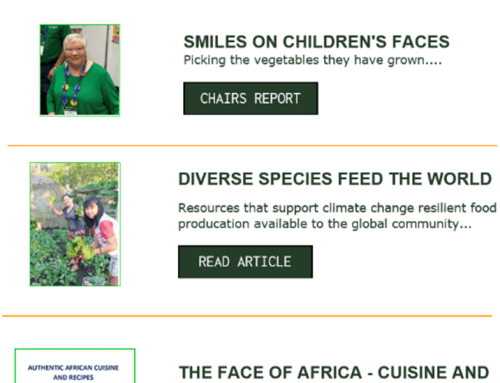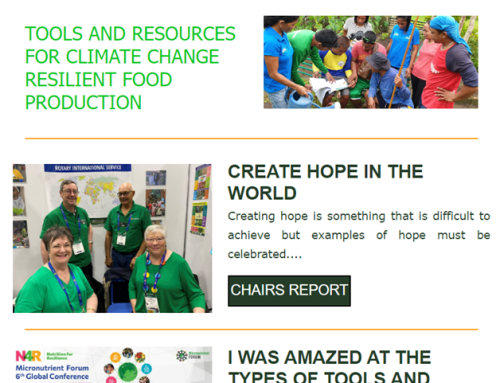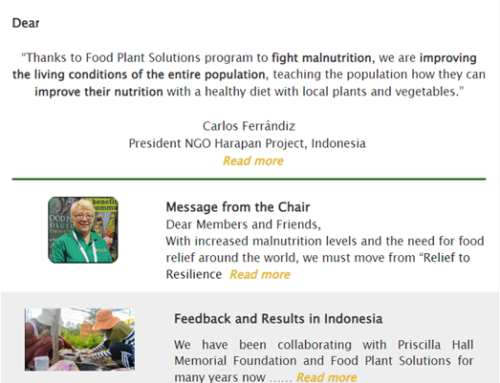Our April newsletter has inspiring articles about programs in PNG, Rwanda and Nepal.
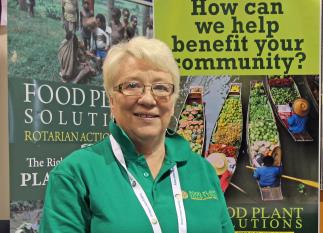
Message from the Chair
As I write this, Rotarians around Australia are preparing for the next Rotary year at the same time as continuing to work on the programs they have planned for this Rotary year. How have you “made a difference” this year?
Many of you have been part of sausage sizzles, art shows, special events or working in the community with people in need. In all these ways you have made a difference in your community.
It is the time now to decide how to distribute the funds you have raised in your clubs. I put in a plea for Food Plant Solutions RAG. We are in constant need of funds to allow us to prepare educational publications in a timely manner, for people in countries that need them most. We have publications for over 30 countries around the world, including Australia, which assist those already working with communities to educate people about what plants to grow and eat and why they are important, therefore lessening the effects of malnutrition.
We are having success, as can be seen by the report from the Vietnamese project and others that can be downloaded from our website and in the last few weeks with the workshop we held in Hobart for our new Tasmanians (Nepalese people).
But we need funds to continue and to be able to assist people most in need when they ask for help, and not have to wait until we have first raised the money.
If every club in the world, each gave $500 a year, we would be able to do so much more.
Remember; “Hunger and malnutrition kills 1.5 times more people than AIDS, tuberculosis, malaria and natural disasters combined.”
Please help.
Yours in Rotary Service.
PDG Una Hobday, Chair, Food Plant Solutions
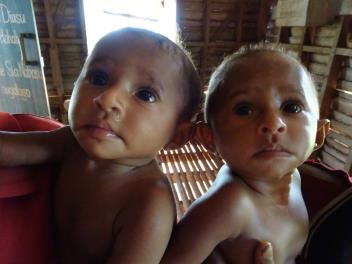
Alleviation of Malnutrition in Papua New Guinea– Progress Report
Dr Russ Stephenson – Project Leader Planning, based on the resources of Food Plant Solutions (FPS), has been proceeding for two years and is ready to go! An application for funding through The Rotary Foundation will be submitted soon. The focus is on the Biami people of the Western Province, Papua New Guinea, who live in one of the most impoverished areas in the country where infant malnutrition (the primary focus) is high. The people are dirt poor! The project will provide education and awareness to motivate people to adopt better diets. Information will be provided at Village Workshops. Each family will be given a concise, illustrated booklet of project messages as an ongoing reference and guide to help mothers produce healthier, stronger and smarter babies. A poster recommending daily food intake of local foods has been produced. The project will provide supplementary planting materials of coconut, corn, beans and peanuts and improved gardening practices.
Importantly for FPS, before and after project surveys of at least 10% of the population (6 representative villages) will be conducted to show the effectiveness of the project in (hopefully) reducing child malnutrition. The survey will include general data on the village, its size, remoteness, proximity to a health centre/aid post, family details, mother’s health (number of children, pregnancy, still births, family planning, breast feeding, etc, hygiene, and diet), infant’s health (weight/age, immunisations, sickness and diet). It is hoped that the project messages will be adopted and show the impact of mother and infant diets on malnutrition. This statistically sound, quantitative data will justify the widespread adoption of FPS approaches to alleviating malnutrition and hunger. It should also guide the development of future FPS projects to optimise their effectiveness.
For more information contact: info@foodplantsolutions.org
Attention Please!
Are you attending Rotary International Convention? Food Plant Solutions is!
We will have:
A booth – number 224 and a workshop on Saturday, 23rd of June, room 803a, 14:30 to 16:00.
I would love to meet as many of you as possible, hear about your success, your thoughts on our projects, hear about our successes this year and get your thoughts on where to next.
PLEASE come and say ‘Hi’ at the booth and perhaps relieve me so I can grab a coffee?!
See you in Toronto! Una
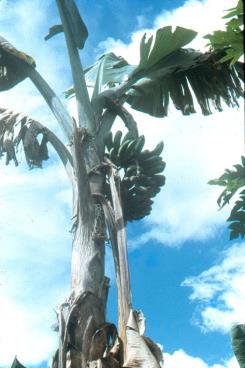
Uganda’s Local Plants
Bruce French – Officer of the Order of Australia
Having just come home from a very vibrant Ugandan youth choir concert means that Uganda is on my thoughts. I tend to keep a range of statistics on my computer about countries of the world so it is easy to see where they rank. Uganda is in the top forty for countries with the largest number of children who don’t live long enough to attend school. 86% of the population are rural and with about 40 million population and one of the most rapidly increasing in the world, growing enough good food will remain a challenge.
Uganda has 1,185 different edible plant species growing in the country. One of the tragedies is when some well-funded scientists with good intentions start to apply their reductionist philosophy to the rich diversity, in an attempt to address some of the deficiencies. Ugandans around Lake Victoria have bananas as their starchy staple. They have 238 cultivated varieties that meet a diversity of roles in the meals. I shudder when I hear some scientists are attempting to produce one superior kind that is rich in Vitamin A. Instead they should look at some of the over 600 dark green edible leaves, many of them rich in proVitamin A, which when cooked in oil, becomes available as Vitamin A. Most of the 600 different edible leaves are rich in iron for anaemia and folates that are especially important for pregnant women. So rather than waiting for high tech solutions we simply need to empower people with good and appropriate information.
The publications by Patrick Maundu in Kenya on how to mix leaves to get an attractive dish and the cookbooks by CADS in Zimbabwe on how to prepare local foods well offer attractive ways into the future for sustainable nutritious food production.
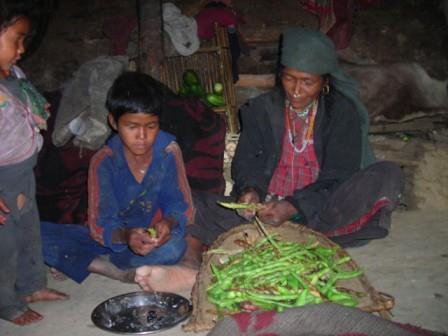
Our Nepalese Partner – DEPROSC
Ganesh Kumar K.C. (Program Advisor, DEPROSC Nepal and Agriculture Specialist)
Development Project Service Centre (DEPROSC) Nepal is a national level not for profit Non-Government Organization established in 1993 with an eagerness to contribute in poverty reduction and social change through its integrated approach in multiple disciplines. It values neutrality, transparency, flexibility, inclusion, participation and pro poor approach. With the vision to see a peaceful, prosperous, and empowered rural Nepal, DEPROSC Nepal has been working in seven thematic areas including food security, nutrition and livelihood, education, community assets, DRR and humanitarian response, health and WASH, natural resource management, and microfinance. In its 25 years of dedication towards poverty reduction, DEPROSC Nepal has reached to 433,853 families in 60 districts across Nepal with different programs.
Food security, nutrition and livelihood is one of the major working area of DEPROSC Nepal. In this context, DEPROSC Nepal teamed up with Food Plant Solution to translate the field guide “Potentially Important Food Plants of Nepal” in Nepali language using its technical expertise. It will endeavor to advocate the importance of under-utilized indigenous plants for improving nutrient securing in malnourished children, women and men in collaboration with government, other NGOs and farmer cooperatives. In addition, DEPROSC will publish the translated field guide and disseminate the material among the related stakeholders, farmers groups, and farmers’ cooperatives with the vision of sharing of knowledge at larger scale and promote use of local plants to meet the nutrient requirement and fight malnutrition.
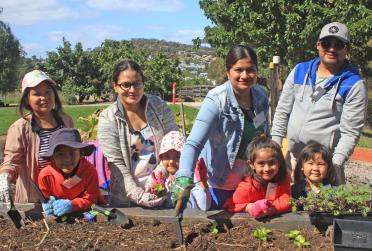
Fresh Food for New Tasmanians
Picture this:
You are an immigrant to a country which, in contrast to all that you are familiar with, is in a different climate, with different soils, and different plants which will flourish in these conditions. You are keen to be a good provider for your family and the idea of growing fresh fruit and vegetables is a part of that. Where do you start? Where do you get useful information? How can you find out about the soils and the plants?
Food Plant Solutions Rotary Action Group, the Royal Society, and members of two Tasmanian Rotary Clubs, RCs North Hobart and Hobart, working with TAFE Tasmania, conducted a workshop for some members of the Nepalese community on March 4th.
The participants, both adults and children, were delighted with the opportunity, with the information they had received, and with the beginnings of their own gardens, which they took home with them. A vegetarian Nepalese lunch was provided by the Hotel Grand Chancellor, who should be very proud that lunch was so well received that the recipes were asked for.
For more information contact: info@foodplantsolutions.org

Rwandan Reconciliation Crops
Sabrina Joy Sibomana – Co-Founder and Director, The Mustard Seed Institute
The Mustard Seed Institute (MSI) is proud to partner with Food Plant Solutions in efforts to improve people’s lives in Rwanda. MSI works in an impoverished rural community where the population survives on subsistence agriculture. MSI has a model farm and is building a Community Innovation Centre to enable training courses to be provided to the community. A key aim is to bring agricultural innovations to the community, to improve agricultural productivity and ensure food security.
MSI host a Farmer Field School, which involves practical, on-farm training for local people, on how to improve their farming skills. The school grows crops of pineapples, watermelons, maize, beans and potatoes. Pig farming has been introduced as a means of combating extreme poverty, since pigs breed rapidly and require little space and investment. And, a plant nursery has been developed to provide seedlings for trees to prevent soil erosion.
Water management is a key challenge, so MSI seek to develop strategies to improve water storage and irrigation systems.
MSI’s overall vision is to unite the community toward a common goal of economic transformation.
For more information contact: info@foodplantsolutions.org or sabrina@msi.rw


